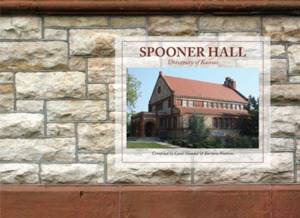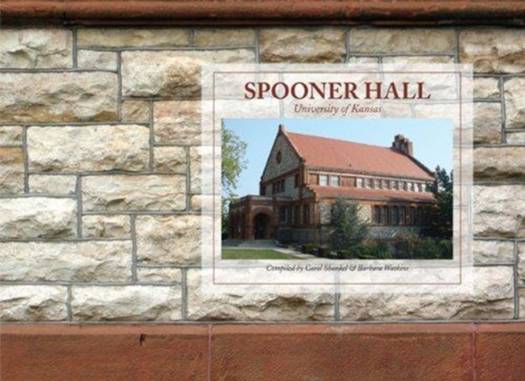
Bedankt voor het vertrouwen het afgelopen jaar! Om jou te bedanken bieden we GRATIS verzending aan op alles gedurende de hele maand januari.
- Afhalen na 1 uur in een winkel met voorraad
- Gratis thuislevering in België
- Ruim aanbod met 7 miljoen producten
Bedankt voor het vertrouwen het afgelopen jaar! Om jou te bedanken bieden we GRATIS verzending aan op alles gedurende de hele maand januari.
- Afhalen na 1 uur in een winkel met voorraad
- Gratis thuislevering in België
- Ruim aanbod met 7 miljoen producten
Zoeken
Spooner Hall
University of Kansas
Hardcover | Engels
€ 50,95
+ 101 punten
Omschrijving
"Many people wonder which is the best building on campus. It's a popular question to ask the architectural faculty. Although I don't have any idea about what they may mean by 'best, ' I have always given the same answer: Spooner Hall. Even before I went inside Spooner, I could see that it was a building of distinction. It is well proportioned, and it is evident from the way that it has adapted and survived that it has a good bone structure."--Barry Newton, KU Professor of Architecture Here is the biography of a much-loved architectural landmark. Spooner Hall, the sixth building to be erected at the University of Kansas, is a Romanesque structure in two colors of stone (Oread limestone quarried onsite and imported Dakota red sandstone) and sits proudly atop Mount Oread with a beautiful view over the valley to the east. Carol Shankel and Barbara Watkins bring together photographs and documents that trace the building from its construction in 1893 to its current use, highlighting the many colorful personalities associated with the building along the way. Their book celebrates not only the building's architectural richness and importance, but also its changing roles. For more than a century, Spooner Hall has shown itself to be remarkably adaptable to the University's needs and aspirations. Funded by a gift from William B. Spooner, a Boston leather merchant and philanthropist, the building was designed by the nationally known architectural firm of VanBrunt & Howe. The Spooner Library was completed in 1894, with a capacity of about one hundred thousand volumes--almost five times as many as the University then had. Thirty years later, in 1924, it became the Spooner-Thayer Museum of Art, and then in 1979 the University of Kansas Museum of Anthropology. The renovation of the main floor in 2007, recognized for excellence by the Kansas chapter of the American Institute of Architects, includes acoustical tile ceilings, bamboo flooring, new lighting, and state-of-the-art audio-visual and internet connections. It is now The Commons, a space intended to encourage research and teaching across the domains of the natural sciences, the arts, and the humanities--"a space where everyone has the right to give voice." The book features wonderful period photographs; excerpts from official university reports, newspapers, and correspondence; and Carol Shankel's interview with two former KU art museum directors who share their special memories of the building. Anyone associated with the University of Kansas will treasure this book and its celebration of a beloved campus icon.
Specificaties
Betrokkenen
- Uitgeverij:
Inhoud
- Aantal bladzijden:
- 72
- Taal:
- Engels
Eigenschappen
- Productcode (EAN):
- 9780700616916
- Verschijningsdatum:
- 10/11/2009
- Uitvoering:
- Hardcover
- Formaat:
- Genaaid
- Afmetingen:
- 282 mm x 218 mm
- Gewicht:
- 498 g

Alleen bij Standaard Boekhandel
+ 101 punten op je klantenkaart van Standaard Boekhandel
Beoordelingen
We publiceren alleen reviews die voldoen aan de voorwaarden voor reviews. Bekijk onze voorwaarden voor reviews.










